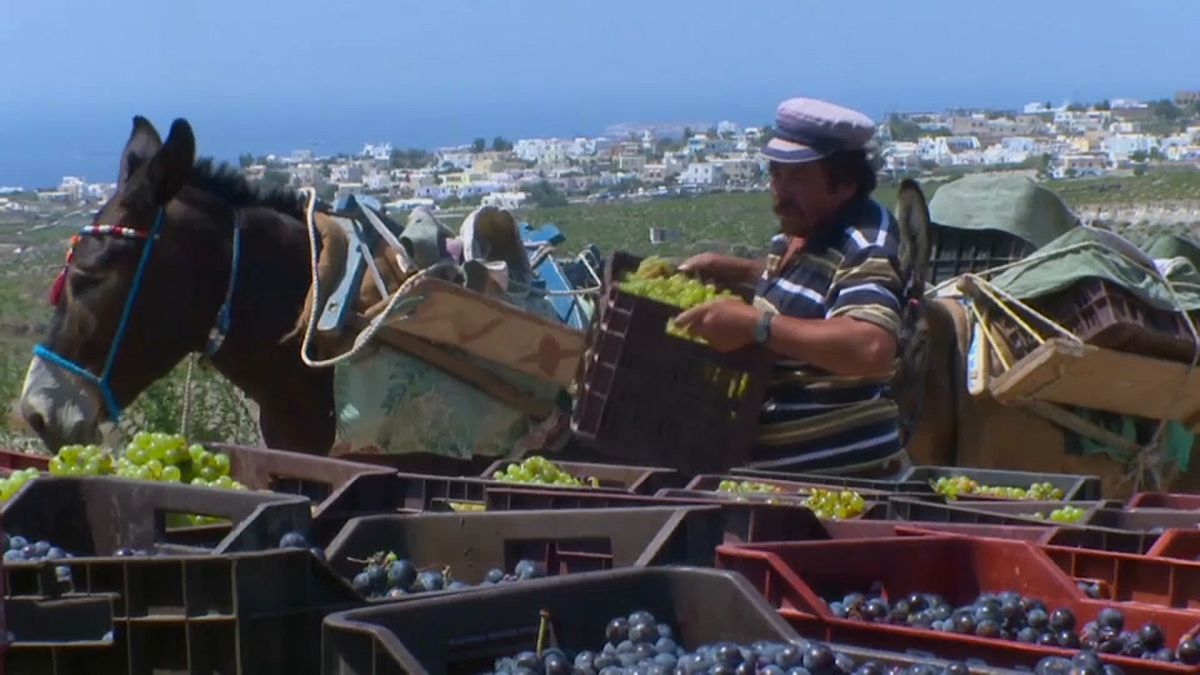Santorini wines are famously sharp but higher temperatures change the acidity of the grape and lead to sweeter wine.
Climate change is creating new challenges for Greek wine producers. The grape harvest is down 30 per cent since 2018 and 50 per cent from 2017, according to one Santorini winery's chief oenologist.
Winemakers fear that Increasing temperatures are also changing the character of the remaining grapes – Santorini wines are famously sharp but higher temperatures could change the acidity of grape varietals and result in a more fruity, sweeter wine in the future.
Stella Papadimitriou at Hadjidakis winery says the harvest has been smaller every year for the past decade. She believes rising temperatures and changes in rain patterns are among the biggest factors for the decrease.
The wine industry worldwide has been rocked by the effects of climate change, with grape quality and vineyard production immediately impacted by the slightest change of temperature.
She said: "In 2019, the current harvest is 30 to 40 per cent less than what it was in 2018. But if we compared it to 2017, then we are talking about over a 50 per cent reduction."
But it is the potential change in character rather than in yield that is the chief concern of Santorini winemakers.
"The actual vines will certainly continue to exist even in the most difficult areas, but the quantity of grapes will decrease and the quality will change. All we can do, since we cannot go against climate change, is to gradually change some of the techniques that we employ," says Papadimitriou.
Papadimitriou believes those changes will have to be implemented in the vines – irrigation projects and protection against sunburn for grapes. In Santorini, the vines are pruned into a low circular basket allowing the leaves to grow around the grapes to protect them from the wind and the sun.
Santorini is thought to have some of the oldest vineyards in continuous cultivation in the world. Local wineries say some of the vine roots are centuries old. Thanks to volcanic soil and strong winds, the vines on the island are free from diseases and pests and most farmers cultivate their vineyards organically.
Gavalas Winery has been in the hands of the same family for five generations. The winery and its producers have slowly but steadily altered their harvest calendar in recent years.
"From year to year there are small differences, some years are hotter, some are less so. Last year we started [the harvest] around 28, 29 July. The year before last, it was 5 August and this year, we started around 8 August.
"But we have noticed that in general, compared to 30 or 40 years ago, we start about 2 weeks earlier because the temperatures have gone up and the climate is hotter," says co-owner Vagelis Gavalas.
The island of Santorini measures 9,000 hectares, with 1,200 hectares dedicated to vineyards. The small number of farmers are in constant struggle with new hotels and construction projects being built on this island, which receives more than 2 million visitors every year. To add to the battle for space, producers fear that there there will be soon a fight for water.
Irrigation is currently only used by a tiny fraction of vineyard owners but as heatwaves become more frequent and rain patterns unpredictable, many are looking at this option.
Carved in the cliffs overlooking Santorini's most iconic view, the Venetsanos Winery was the first winery to export Assyrtiko wines to foreign markets. Manager Petros Vamvakousis says he is is worried about rising temperatures and increased competition for valuable land plots and water with the powerful tourist sector on the island.
"The way we deal with the environment and the vineyard, in particular, is certainly very important here. I think we are at a turning point. The winemakers and the vineyard owners will need to come together in the next few years and identify the most important factors that are required to keep going," he says.
"We definitely need water to help the crops, especially the vine. And water is not easy to find right now on the island," says Vamvakousis.
